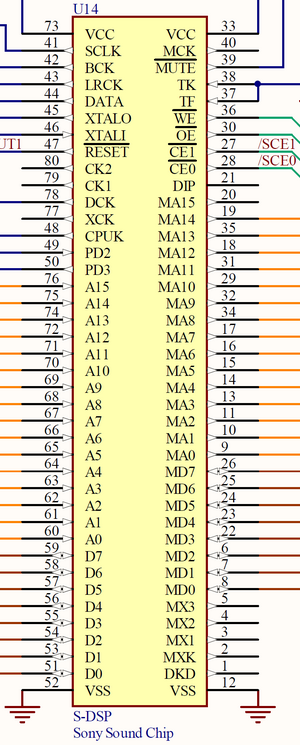We've just updated MediaWiki and its underlying software. If anything doesn't look or work quite right, please mention it to us. --RanAS
S-DSP: Difference between revisions
From SnesLab
(→References: bullet point -> ref) |
(linkify) |
||
| Line 30: | Line 30: | ||
| || | | || | ||
|- | |- | ||
| 0C || MVOL (L) | | 0C || [[MVOL]] (L) | ||
|- | |- | ||
| 1C || MVOL (R) | | 1C || [[MVOL]] (R) | ||
|- | |- | ||
| 2C || EVOL (L) | | 2C || EVOL (L) | ||
| Line 46: | Line 46: | ||
| 7C || ∴[[ENDX]] | | 7C || ∴[[ENDX]] | ||
|- | |- | ||
| 0D || EFB | | 0D || [[EFB]] | ||
|- | |- | ||
| 1D || --- | | 1D || --- | ||
Revision as of 19:53, 11 August 2024

S-DSP in region D4 of the jwdonal schematic
The S-DSP is the digital signal processor. It produces audio for the DAC and is controlled by the S-SMP. It is clocked by X2.
It has 128 registers (DSPRAM) that can be manipulated by the S-SMP, some of which serve no hard-wired purpose and can be used as general-purpose RAM. Registers with a ∴ before their name are written to by the S-DSP itself during active processing. Here are some of 128:
| Address | Register |
|---|---|
| 00 | VOL (L) |
| 01 | VOL (R) |
| 02 | P (L) |
| 03 | P (H) |
| 04 | SRCN |
| 05 | ADSR (1) |
| 06 | ADSR (2) |
| 07 | GAIN |
| 08 | ∴ENVX |
| 09 | ∴OUTX |
| 0C | MVOL (L) |
| 1C | MVOL (R) |
| 2C | EVOL (L) |
| 3C | EVOL (R) |
| 4C | KON |
| 5C | KOF |
| 6C | FLG |
| 7C | ∴ENDX |
| 0D | EFB |
| 1D | --- |
| 2D | PMON |
| 3D | NON |
| 4D | EON |
| 5D | DIR |
| 6D | ESA |
| 7D | EDL |
| xE | --- |
Many of the 128 registers appear to not be used by the S-DSP directly, but get copied to internal registers the S-SMP does not have access to. The highest sound frequency that the S-DSP can produce is 16kHz, because of the 32kHz rate that sample-points are output. [1]
References
- https://problemkaputt.de/fullsnes.htm#snesapudspbrrpitch
- page 3-7-1 of Book I of the official Super Nintendo development manual
- subparagraph 22.5.2 on page 2-22-1 of Book I, lbid.

